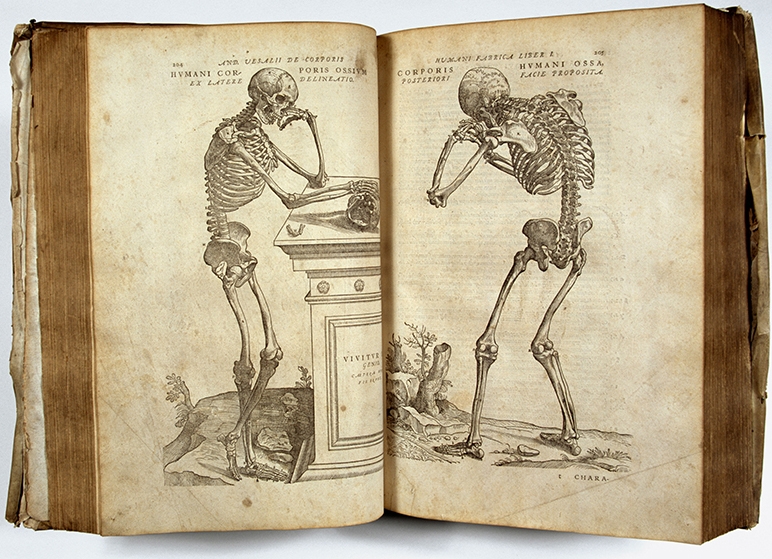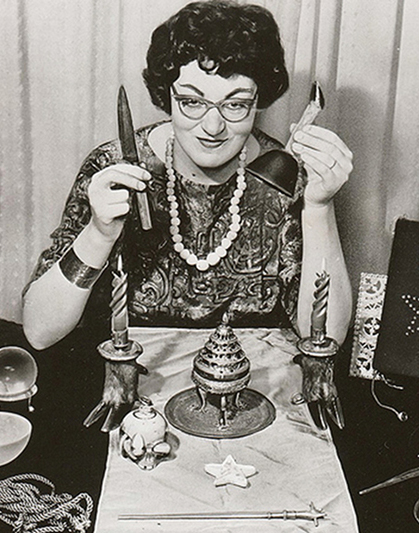Spring 2020 Honors College Retro Readings to Explore Secret Rituals and the Logistics of Science

Science Works: Pages from "De Corporis Humani Fabrica," by Andreas Vesalius (1514-1564), a series of pioneering human anatomy books from the library archives of Exeter Cathedral.
In Honors College Retro Readings courses, students from all colleges tackle classic texts from a contemporary, multidisciplinary point of view. Next spring students will witness an expansion of topics, with courses offered on beliefs in hidden knowledge and the logistics of science. Previous topics include the works of J.R.R. Tolkien, Darwin and J.K. Rowling's Harry Potter series.
These 75-minute, one-credit-hour honors courses pair students with expert faculty to provide them with a "Great Books" experience, one of the hallmarks of a liberal arts education.
"These short courses allow students from all disciplines to really dig deep and evaluate the world around them," said Lynda Coon, dean of the Honors College and professor for Bible, a recent Retro Readings course. "We couldn't be more excited about the partnerships these courses afford us with departments across campus."
Honors students must apply to participate in Retro Readings courses, and seats are typically capped at 12 per class. Interested students are encouraged to read more about the courses and professors on the Retro Readings web page.
The final deadline to apply is 11:59 p.m. Friday, Nov. 1.
The spring 2019 Retro Readings are:
 Doreen Valiente: Secrets will include readings by Doreen Valiente (1922-1999), one of the early feminist leaders and a high priestess of British Wicca, who helped make Wiccan practices safe for women. |
Secrets: Honors College Director of Development John Treat, who holds a doctorate in history and whose research focuses on 19th-century secret societies and their impacts on concepts of race and citizenship, will engage students through a variety of primary texts to examine the rise and development of Western esotericism from its early modern antecedents to the 20th-century rise of Neopaganism. Belief in hidden knowledge, initiations and ritual magic has been persistent through Europe and North America's industrial and scientific revolutions. The course will investigate the lasting appeal of esoteric practices such as tarot cards, witchcraft and Freemasonry in an increasingly scientific and secular culture. Overall, students will test Wouter Hanegraaff's claim that Western esotericism is best understood as the discarded knowledge of earlier eras.
How Science Works: In this course, Parks Family Professor of Science Education William F. McComas and his students will evaluate how science produces and validates knowledge. Students will read what is regarded as the most important book in the field, Thomas Kuhn's The Structure of Scientific Revolutions (1962). Kuhn's work has influenced scholarship and popularized terms such as paradigm but has also been misinterpreted, rejected and even denied by many. Students will have the opportunity to evaluate and explore Kuhn's vision of science for themselves. The semester will then conclude with the contemporary account of scientific discovery, Your Inner Fish, by Neil Shubin (2008). Shubin's work will enable students to envision what modern scientists actually do and how much "truth" there in this thing called science.
About the Honors College:The University of Arkansas Honors College was established in 2002 and unites the university's top undergraduate students and professors in a learning environment characterized by discovery, creativity and service. Each year the Honors College awards up to 90 freshman fellowships that provide $72,000 over four years, and more than $1 million in undergraduate research and study abroad grants. The Honors College is nationally recognized for the high caliber of students it admits and graduates. Honors students enjoy small, in-depth classes, and programs are offered in all disciplines, tailored to students' academic interests, with interdisciplinary collaborations encouraged. Fifty percent of Honors College graduates have studied abroad and 100 percent of them have engaged in mentored research.
Topics
Contacts
Darci Walton, dean's intern
Honors College
479-575-7678,
dewalton@email.uark.edu
Kendall Curlee, director of communications
Honors College
479-575-2024,
kcurlee@uark.edu
Headlines
Affairs of the Heart
Find out how biomedical engineering professor Morten Jensen is developing innovative devices to produce better outcomes in cardiovascular medicine.
Students, Faculty and Alumni Kick Off Centennial Year of School of Law
Founded April 14, 1924, the School of Law faculty, students and alumni started the celebration of its centennial year with a Founders Day event and will continue with more commemorative events this coming fall.
Yearly Academic Award Winners, Ambassadors Recognized by Bumpers College
Schyler Angell, Lexi Dilbeck, Cason Frisby, Tanner Austin King, Anna Brooke Mathis, Carrie Ortel, Lucy Scholma, Kadence Trosper and student ambassadors were honored at the college's annual reception.
World Premiere of 'Cries from the Cotton Field' Slated for May 8
Cries from the Cotton Field chronicles the journey of 19th century Italian immigrants from northern Italy to the Arkansas Delta and ultimately to Tontitown. It will premier at 6 p.m. May 8 in Springdale Har-Ber High School.
Fay Jones School's Earth Day Event Spotlights Sustainable Materials and Projects
"One day doesn't seem like a lot, but one day can empower individuals and groups, energize them to work for change and innovate for transformative solutions," professor Jennifer Webb said of the students' design work.




